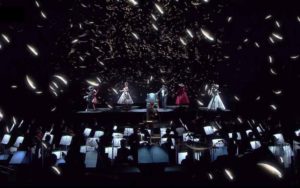
A Riverder Le Stelle – A Behind the Scenes Look At the Teatro alla Scala’s Big Night
By Giulio AlberoniIt was a night meant to go down in history.
As we entered the halls and through the corridors of access to the boxes of the Teatro alla Scala, we could see the protagonists of this particular evening full of pride and, in the case of director Davide Livermore, liveliness and joy. The protagonists and spectators were all there, a small group of people finally arriving in the ridotto of the Scala theater. The large room on the first floor where people usually chat during breaks while drinking Spumante sparkling wine.
Now, in that room with high columns and golden friezes, the beginning of the performance was awaited, a showcase that would certainly show something new, unimagined. Not even desired, but that in the heart of a pandemic, it looked like a ray of sunshine in the darkness.
Among the first artists to speak with journalists was Francesco Meli, who related his emotions regarding the change of the opening night.
“Normally the Prima della Scala is an extraordinary event. A memorable day, but this year its uniqueness is even more marked. The absence of the audience is something we singers are not used to. Everything is different today, even the theater itself which has undergone a metamorphosis to allow us singers and the orchestra to be present in the hall at the same time. So it is very strange, the audience has disappeared and in its place, a large stage has appeared on which the orchestra is housed,” Meli stated. “Even the space where we singers sing and act has expanded, it is as if the whole theater had become a stage. There will be no applause from the audience, the emotion that applause gives us, but I’m sure we will soon be back to experience those emotions.”
The journalists were then taken to the theater, where according to the original programming “Lucia di Lammermoor” should have been staged. But instead, a different show was about to be staged, the fusion of opera, cinema, ballet, and prose. Entering the hall, the theater looked different, the stage hidden in its lower part, with only the top part of the curtain with the great cross symbol of Milan visible to the public.
Everything was different from a traditional premiere at the Scala theater. There were no flowers, cables, and large cameras in their place; the armchairs were replaced by the essential chairs of the musicians. That large empty space led us, out of a kind of reverence, to speak in silence, whispering. Normally at the premiere of the La Scala, the audience forms a single great buzz of people who meet, talk, and greet each other. Now our footsteps can be heard echoing in the silence of that great stage. The curtain is open, it will not open by dancing lightly with its red cloak. For those attending the show from home, this traditional act will be replaced by the beginning of the television broadcast or the live stream on the internet.
Suddenly the darkness. Cameras dot the darkness with dozens of small red lights. The notes of “Io son l’umile ancella” by “Adriana Lecouvreur” flood the room with the singing of the extraordinary Mirella Freni. This will be followed by the Italian national anthem, and then Giuseppe Verdi with the prelude to “Rigoletto” and “Cortigiani vil razza dannata” with Luca Salsi on stage. Then comes “La donna è mobile” sung by Vittorio Grigolo. More Verdi follows in the form of “Ella giammai m’amò” from “Don Carlo,” as well as “Per me giunto” and “O don fatale.”
And then comes Gaetano Donizetti’s “Lucia di Lammermoor.” This should have been the night to celebrate Donizetti’s masterwork, but it was not due to the continued spread of COVID-19. Interpreting an aria form the work is the talented Lisette Oropesa who was to sing the title role in a new production.
From there we get more music by Puccini, Wagner, Donizetti. There is a moment when ballet takes the place of Opera. We hear Tchaikovsky’s “The Nutcracker” performed on stage by Nicoletta Manni and Timofej Adrijashenko. The lineup of the evening then continues with more Verdi, Giordano, Puccini, and Rossini interspersed with readings taken from texts by Sting, Eugenio Montale, and Cesare Pavese.
The light finally turns on and the director Davide Livermore enters the stage together with the superintendent of the Scala Theater Dominique Meyer.
Livermore speaks to us journalists: “What you have seen is something new. I don’t know if it’s a beginning or a unicum. Many parts of this show were recorded before the inaugural night, it was impossible to organize a traditional gala with anti-COVID rules. When we thought about this inaugural evening we realized that we didn’t have to stage an Opera, what we had to assemble was a show that expressed art in many of its forms, because it is the art form which we must restart to build for the future. Theater is made up of art and beauty and it is precisely from art and beauty that today we have an opportunity to leave for the future”.
Categories
Special Features

